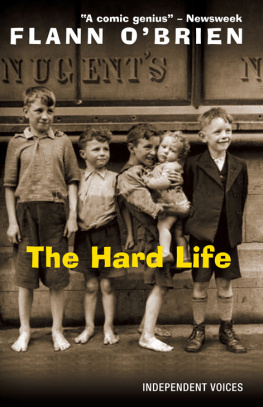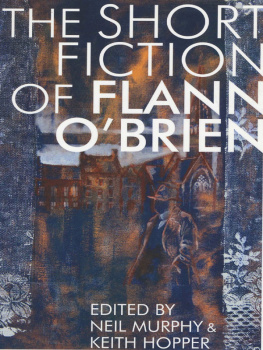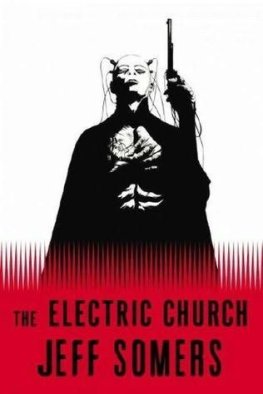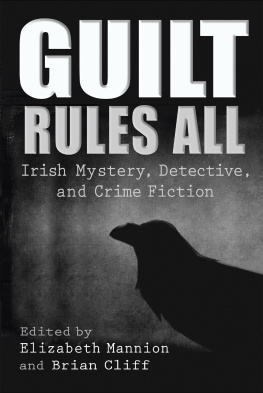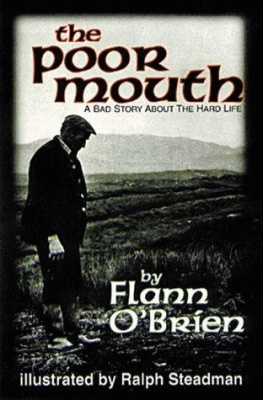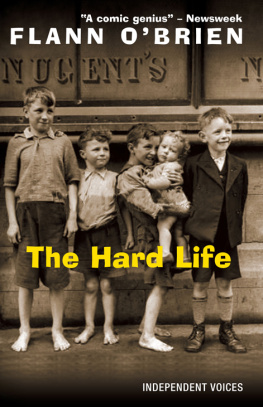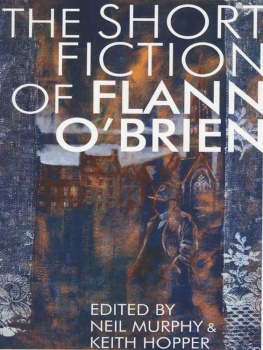
I honourably present to
GRAHAM GREENE
whose own forms of gloom I admire, this misterpiece
All the persons in this book are real and none is fictitious even in part
Tout le trouble du monde vient de ce qu on ne sait pas rester seul dans sa chambrePASCAL
CONTENTS
I T is not that I half knew my mother. I knew half of her: the lower halfher lap, legs, feet, her hands and wrists as she bent forward. Very, dimly I seem to remember her voice. At the time, of course, I was very young. Then one day she did not seem to be there any more. So far as I knew she had gone away without a word, no good-bye or good night. A while afterwards I asked my brother, five years my senior, where the mammy was.
She is gone to a better land, he said.
Will she be back?
I dont think so.
Mean to say well never see her again?
I do think we will. She is staying with the old man.
At the time I found all this very vague and unsatisfying. I had never met my father at all but in due time I was to see and study a faded brown photographa stern upright figure wearing great moustaches and attired in a uniform with a large peaked cap. I could never make out what the uniform stood for. He might have been a field-marshal or an admiral, or just an orderly officer in the fire brigade; indeed, he might have been a postman.
My memory is a bit mixed about what exactly happened after the mammy went away but a streel of a girl with long lank fair hair arrived to look after myself and the brother. She did not talk very much and seemed to be in a permanent bad temper. We knew her as Miss Annie. At least that is what she ordered us to call her. She spent a lot of time washing and cooking, specializing in boxty and kalecannon and eternally making mince balls covered with a greasy paste. I got to hate those things.
If were ever sent to jail, the brother said one night in bed, well be well used to it before we go in. Did you ever see the like of the dinner were getting? I would say that woman Annie is a bit batty.
If you mean the mince balls, I said, I think theyre all rightif we didnt see so many of them, so often.
Im certain theyre very bad for us.
Well, that paste stuff is too thick.
How well the mammy thought nothing of a bit of ham boiled with cabbage once a week. Remember that?
I dont. I hadnt any teeth at that time. Whats ham?
Ham? Great stuff, man. Its a class of a red meat that comes from the county Limerick.
Thats merely my recollection of the silly sort of conversation we had. Probably it is all wrong.
How long this situationa sort of interregum, lacuna or hiatuslasted I cannot say, but I do remember that when myself and the brother noticed that Miss Annie was washing more savagely, mangling and ironing almost with ferocity, and packing, we knew something was afoot. And we were not mistaken.
One morning after breakfast (stirabout and tea with bread and jam) a cab arrived and out of it came a very strange elderly lady on a stick. I saw her first through the window. Her hair peeping from under her hat was grey, her face very red, and she walked slowly as if her sight was bad. Miss Annie let her in, first telling us that here was Mrs Crotty and to be good. She stood in silence for a moment in the kitchen, staring rather blankly about her.
These are the two rascals, Mrs Crotty, Miss Annie said.
And very well theyre looking, God bless them, Mrs Crotty said in a high voice. Do they do everything theyre told?
Oh, I suppose they do, but sometimes its a job to make them take their milk.
Well, faith now, Mrs Crotty said in a shocked tone, did you ever hear of such nonsense? When I was their age I could never get enough milk. Never. I could drink jugs of it. Buttermilk too. Nothing in the wide world is better for the stomach or the nerves. Night and day I am telling Mr Collopy that but you might as well be talking to that table!
Here she struck the table with her stick. Miss Annie looked startled that her trivial mention of milk should induce such emphasis. She took off her apron.
Well see, she said ominously. Is the cabby outside? I have all the stuff ready in there.
Yes, Mr Hanafin is out there. Just call him in. Are these young gentlemen washed?
As far as possible. What the pair of them need is a good bath. You know the way the water is here.
The Lord save us, Mrs Crotty said grimacing, is there anything under heavens sky more terrible than dirt. But sure well see after all that in good time, please God. Well now!
Miss Annie went out and came back with Mr Hanafin the cabby. He had a ruby face, maybe from all the porter he drank, and was correctly dressedhard hat and a caped surcoat of dark green.
The top of the morning to you all, he said genially. I was just saying, Mrs Crotty, that Miss Annie is looking very well.
Is that so? Well, she had a bit of a handful here but then Mr Collopy is another handful and maybe a little rest from him was as good to her as a fortnight in Skerries.
Ah now she has great colour, Mr Hanafin replied pleasantly. Is them two young archdukes to be me passengers?
Yes, Miss Annie said, they are the main cargo. See you dont spill them out.
Be the dad, Mr Hanafin said smiling, Marius will be delighted. Well get a right trot: this morning.
Who is Marius, the brother asked.
The mare, man.
Afterwards the brother told me he thought this was a strange name for a mare. Maria would have been better. He was a very wide-awake character even then. I think I used some coarse word here about the animal outside. He told me I should not speak like that.
Why?
Teresa would not like it?
Who is Teresa?
Our sister.
Our sister? WHAT?
Mrs Crotty told Miss Annie to show Mr Hanafin where the baggage was, and she led him into the back room off the kitchen. There was a lot of noisy fumbling and pulling. The bulk of the baggage could only be explained by having blankets and pillows and other bedclothes tied up, for the wardrobe of the brother and myself was not well extensive. Perhaps there were curtains there, too.
At last Mr Hanafin had everything packed away on the roof of the cab. It was summer and the brother and I travelled as we stood. Miss Annie carefully locked the house and she and Mrs Crotty stowed themselves fastidiously in the back seat of the cab, ourselves sitting facing them. The journey was enjoyable, great houses sliding past, trams clanging in the middle of the road, large thickly-made horses hauling heavy drays, and our own Marius making delightful music with her hooves. As I was later to know, our destination was Warrington Place, a rather junior continuation of lordly Herbert Place along the canal on the south side of the great city of Dublin.
Reckoning backwards, I find I was about five years old. The year was 1890, and my young bones told me that a great change was coming in my life. Little did I know just then how big the change. I was about to meet Mr Collopy.
T HERE is something misleading but not dishonest in this portrait of Mr Collopy. It cannot be truly my impression of him when I first saw him but rather a synthesis of all the thoughts and experiences I had of him over the years, a long look backwards. But I do remember clearly enough that my first glimpse of him was, so to speak, his absence: Mrs Crotty, having knocked imperiously on the door, immediately began rooting in her handbag for the key. It was plain she did not expect the door to be opened.
There is a clap of rain coming, she remarked to Miss Annie.
Next page
